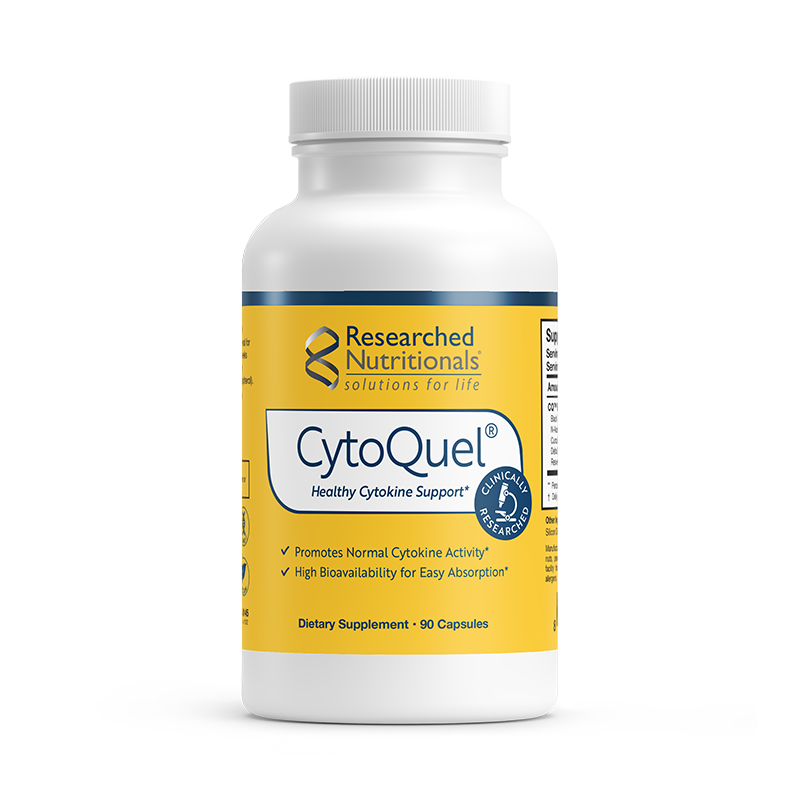
How CytoQuel Can Help
Pain can come from a variety of factors including nerve or tissue trauma, being infected by a pathogenic ‘outsider’ (virus, fungus, bacteria, parasite), or cardiovascular inflammation. In the heart’s case- this inflammation will cause a decrease in circulation, irregular heartbeat (arrhythmia), stiffening of the arteries, and diminished vascular function (critical to delivering blood and lymph, oxygen, and nutrients where needed through the body).
Whether being visited by pathogenic microbial strangers, having tissue/nerve damage or cardiovascular inflammation- any and all are likely to activate NF Kappa Beta (NF-κB) –1 implicated in chronic conditions ranging from migraines to autoimmune diseases such as Rheumatoid Arthritis.2
I’ve been singing Researched Nutritional’s CytoQuel‘s praises ever since I started taking it. In turn, I’m receiving letters of appreciation from those using it. In brief, here’s why:

It works fast! I noticed a difference the first day and I consider it to be one of the most effective analgesics I’ve ever come across. Its benefits go far beyond diminishing systemic irritation. Other ways CytoQuel can be of service are:
- Blood clots- it positively affects fibrin-involved in strokes/CVD/tumor formation
- Mast Cell Activation Syndrome (similar symptoms to histamine intolerance including itching, allergies, hives)
- Promotes gut integrity- and in turn helps control TH17- involved with autoimmune damage to tissues
It’s rich in plant antioxidants such as Resveratrol, Curcumin, and Quercetin- known to inhibit aberrant NF-kB, and activate AMPK and Sirtuins. It’s loaded w Acetylcysteine, Delta Gold tocotrienols, and Resveratrol. It possesses all of the benefits associated with green & black tea.
NF-κB represents a central factor in inflammation, stress response, cell differentiation, proliferation, and cell death.3 It links pathogenic signals and cellular danger signals thus organizing cellular resistance to invading pathogens. However, aberrant NF-κB activation contributes to the development of various autoimmune, inflammatory ‘villains’ including rheumatoid arthritis, atherosclerosis, inflammatory bowel diseases, multiple sclerosis, osteoporosis, bone disease, and malignant tumors.4
AMPK has emerged as an innovative treatment for chronic pain (including neuropathic) with exciting potential for disease modification. AMPK activators can lead to a long-lasting reversal of pain hypersensitivity.5 AMPK promotes mitochondrial biogenesis in order to produce more ATP- the ‘currency’ that healthy cells need.
Sirtuins (found in Turmeric, Black tea, red wine & dark chocolate) are known as ‘Guardians of the Genome’. They look highly promising in the support of a wide range of cardiovascular and metabolic diseases including type 2 diabetes mellitus, insulin resistance, cardio hypertrophy and dyslipidemia. They promote angiogenesis and increase blood flow- great for microcirculation!6
Researched Nutritionals ran a human trial for CytoQuel reported in the Journal of Pain Research. Not only did it alleviate all types of pain, it had the unexpected benefit of being great for the heart! It improved microcirculation & reduced Von Willebrand factor (VWF is significantly predictive for adverse cardiac events).
FYI – Nearly identical benefits to green tea, there is a small amount of caffeine found in the black tea of CytoQuel®. Each capsule has about 5 mg caffeine = 2 teaspoons of coffee. You can take all 3 during the day. I take 1 capsule at night to help with any pain that may interfere with my sleep and boy is it good!
Let’s take the sting out of suffering,
Kim
Additional Reading
- NF-κB, an active player in human cancers
- Niderberger E, Geisslinger G. The IKK-NF-kappaB pathway: a source for novel molecular drug targets in pain therapy? FASEB J. 2008;22(10):3432–3442. doi:10.1096/fj.08-109355
- The complexity of NF-κB signaling in inflammation and cancer
- Roles of NF-κB in Cancer and Inflammatory Diseases and Their Therapeutic Approaches
- Targeting AMPK for the Alleviation of Pathological Pain
- Sirtuins and NAD+ in the Development and Treatment of Metabolic and Cardiovascular Diseases